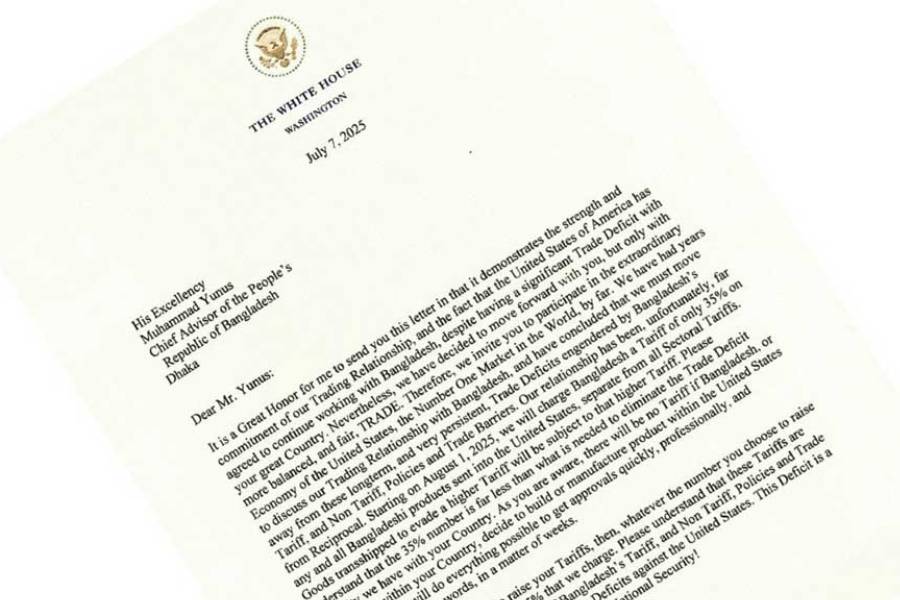

US President Donald Trump has responded to Bangladesh’s request to reconsider a sweeping tariff on its exports, three months after receiving a letter from Chief Advisor Muhammad Yunus.
After a 90-day pause for further negotiations with trade partners following the initial announcement of tariffs in April, reports on Tuesday indicated that the Trump administration was imposing a revised 35 percent supplemental duty on all Bangladeshi products, down from the previously proposed 37 percent, reports bdnews24.com.
The new rate is set to take effect on Aug 1.
Until now, the average US tariff rate on Bangladeshi goods stood at about 15 percent. With the addition of the new levy, the average tariff rate will rise to 50 percent.
Bangladesh is among 14 countries affected by Trump’s new tariffs.
Notably, Vietnam, Bangladesh’s key competitor in garment exports, has secured a reduction in its own tariffs through a new agreement with Washington.
India is reportedly nearing a similar deal.
On Apr 2, shortly after beginning his second term in office, Trump announced a tariff hike on more than 100 countries.
Bangladesh was initially slated to face a 37 percent supplementary duty.
In response, Yunus wrote to Trump requesting a three-month postponement and outlined several steps Bangladesh would take to address the bilateral trade imbalance.
“I would like to assure you through this letter that Bangladesh will take all necessary steps in full support of your trade agenda,” Yunus wrote.
As part of its strategy to address the US concerns, Bangladesh announced tariff exemptions on 626 products in its national budget.
Import duties on 110 of those items were removed entirely.
Despite these efforts, Trump stood firm.
In his letter to Yunus, the US president emphasised the “very large” trade deficit between the two nations as justification for maintaining the tariff increase.
According to Trump, the decision follows “very persistent” concerns over tariffs, non-tariff barriers, and other trade policies adopted by Bangladesh that the US believes have contributed to a long-standing trade deficit.
“Our relationship has been, unfortunately, far from reciprocal. Starting on August 1, 2025, we will charge Bangladesh a tariff of only 35 percent on any and all Bangladeshi products sent into the United States, separate from all sectoral tariffs,” Trump said.
“Nevertheless, we have decided to move forward with you, but only with more balanced, and fair, TRADE. Therefore, we invite you to participate in the extraordinary Economy of the United States, the Number One Market in the World, by far,” he said.
However, no tariff would be applied to products made in the United States by Bangladeshi companies, adding that such ventures would be encouraged and approvals expedited, according to Trump.
He warned that if Bangladesh raises its tariffs in response to the newly imposed 35 percent duty, the same increase will be added to the American tariff as well.
The letter justifies the new tariff structure as necessary to address what it calls years of unfair trade practices and significant trade deficits, which it claims pose a threat to both the US economy and national security.
However, the US may revise the tariff rate depending on Bangladesh’s willingness to open its markets and remove tariff and non-tariff barriers, according to Trump.
“These tariffs may be modified, upward or downward, depending on our relationship with your country. You will never be disappointed with The United States of America,” he said.


 For all latest news, follow The Financial Express Google News channel.
For all latest news, follow The Financial Express Google News channel.